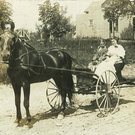GHS Class of 1971: We’re a kind of tribe
To the Editor:
Look, we’ve reached an age that, in high school, we couldn’t imagine. Remember being 17? Now we’re pushing 70. An impossible, inconceivable milestone, but here we are. So, why not celebrate?
Guilderland Class of 1971 graduates, I’m talking to you.
Our 50-year reunion is the weekend of Sept. 30, 2022. Will you be there?
“But I won’t know anyone,” you might think. Or, “What will we have in common after all these years?”
Well, attending the reunion means — despite the hardships of the past two years — you survived the COVID pandemic. That’s something to celebrate together. And there’s so much more.
I moved away from Guilderland in 1978, and on my rare trips back, I’m struck by my good fortune to have grown up in a nice middle-class town with cities and colleges nearby, countryside all around, woods and streams and trails to explore, low crime, kind neighbors who kept an eye on me, a high-quality public school system. Things to celebrate.
We had our groups of friends back then, and I hope to catch up with those people. But equally compelling to me is the chance to meet the folks I didn’t know. In our 50 years apart, we’ve done so much! Whether we married, raised kids, traveled, honed skills, built careers — wherever our lives took us — we learned a ton and became who we are. Among our ranks are nurses, teachers, pilots, engineers, mechanics, musicians, doctors, lawyers, fire chiefs — people who enhanced others’ lives in one way or another. Let’s celebrate that.
Who but our classmates knows exactly what it was like to grow up in Guilderland in the 1960s? We’re a kind of tribe, formed from the same elements. We breathed the same air, felt the same sun, wind, snow and rain, bicycled the same streets and walked the same halls.
Like you, I was in my fifth-grade classroom when President Kennedy was shot. In February 1964, the Beatles appeared on the Ed Sullivan show; we watched as music changed forever. We soaked in the same top-40 songs on WPTR, television cartoons and sitcoms, Vietnam War on the nightly news. Remember hugging textbooks to your chest (girls) or bracing them on your hip (boys)? No backpacks for us.
We experienced the same batch of stereotypes: jocks, freaks, brains, “Bardahls.” If we were lucky, we crossed those boundaries and knew a mix of people. We faced our adolescent growth spurt in lockstep. In each other’s company, our bodies transformed — and our brains poured out torrents of stress hormones and sex hormones. The clumsiness, the zits, the changing voices and see-saw emotions. First kisses, first heartbreaks. You know, all that stuff. We survived it together.
Does it sound silly that I get goose bumps remembering the scent of crisp morning air as I walked to the bus stop? The clang of my locker? My whoosh of joy to spot a friend in the hall? My thumping heart when a cute boy looked my way? To this day, I can conjure the sting of cold vinyl on the back of my legs when I plopped onto the school bus each winter morning. Skirts for girls were the dress code until 1970. Remember, ladies, the thrill of wearing jeans to school for the first time?
And those songs! Just a few bars of “Born to be Wild,” “Light My Fire,” “Bus Stop,” “Hey Jude” — fill in the blank with your favorite song — transport us to our youth, to places, sensations, and emotions. Researchers have found that we experience “reminiscence bumps” in relation to songs we loved as teens, and these autobiographical memories are precious.
A legendary expert on aging, Robert Butler, posited that recalling our pasts, examining big and small things that shaped us, brings large benefits. It helps us accept our choices, boosts our sense of gratitude for the life we’ve been given, loosens our hold on regrets and resentments, and fine-tunes our self-understanding. The lost memories bubbling up when you converse with classmates at the reunion — those are gifts.
Humans have a biological need to belong. Scientists have found that people with strong social ties tend to be healthier. Our brains actually function better when we interact with others and experience togetherness. And the brain chemicals released when we’re with friends — dopamine, serotonin, oxytocin, endorphins — make us happy.
Even when people irk us, they help us grow, because diverse emotional experiences — feeling sad, angry, anxious, or irritated — expand our capacity to feel good. And gratitude, that’s a big one. People who are more grateful are typically happier and more resilient.
On the flip side, the sad reality is that people who lack social support have a higher risk of heart disease and death. Why is the song “Eleanor Rigby” playing in my head?
All kinds of lyrics surface as I write this: Old friends sat on the park bench like bookends. Will you still love me when I’m 64? I did it my way. Yesterday all my troubles seemed so far away.
Our committee has worked hard to plan a reunion that’s fun and welcoming for everyone. The Friday night kick-off brings classes of 1970, 1971, and 1972 together for one big bash. The next night is a cocktail party for 1971 alumni at Orchard Creek Golf Club in Altamont, and the full weekend agenda includes a golf tournament, school tour, history presentation, picnic — all spelled out on our class website at www.guilderland71.com.
Now in my brain I hear “I’m Not Dead Yet” from the hilarious musical “Spamalot,” sung by characters fighting the plague. And though I like dark comedy, I’d rather replace that tune with “Young at Heart.” Let’s focus on “all we derive from being alive” — and celebrate together.
Vicki Meade
Annapolis, Maryland
